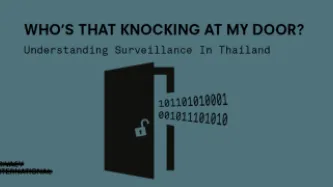Search
Content type: News & Analysis
As Amnesty International and Forbidden Stories continue to publish crucial information about the potential targets of NSO Group’s spyware, we know this much already: something needs to be done.
But what exactly needs to be done is less obvious. Even though this is not the first time that the world has learned about major abuses by the surveillance industry (indeed, it’s not even the first time this month), it’s difficult to know what needs to change.
So how can the proliferation and use of…
Content type: Long Read
Imagine that every time you want to attend a march, religious event, political meeting, protest, or public rally, you must share deeply personal information with police and intelligence agencies, even when they have no reason to suspect you of wrongdoing.
First, you need to go to the police to register; have your photo taken for a biometric database; share the contacts of your family, friends, and colleagues; disclose your finances, health records, lifestyle choices, relationship status, and…
Content type: Examples
In 2013, Edward Snowden, working under contract to the US National Security Agency for the consultancy Booz Allen Hamilton, copied and leaked thousands of classified documents that revealed the inner workings of dozens of previously unknown surveillance programs. One of these was PRISM, launched in 2007, which let NSA use direct access to the systems of numerous giant US technology companies to carry out targeted surveillance of the companies' non-US users and Americans with foreign contacts by…
Content type: News & Analysis
In our latest report “Who’s that knocking at my door? Understanding surveillance in Thailand”, we highlighted various methods of surveillance that the Thai Government employs. Included in these methods was the finding that Microsoft was the only technology company which by default trusts the Thai Government’s root certificate. Root certificates ensure the validity of a website, and protect users from being tricked into visiting a fake, insecure website. Most technology companies including Apple…
Content type: News & Analysis
“It’s like 10,000 spoons when all you need is a knife”. Alanis Morissette thought that was ironic. I never thought so. I suggest a far more ironic lyric to you Alanis - "It’s like the Home Office not listening during a consultation about how it wants to listen to everything you do’. OK, it might not be the catchiest lyric, but you can’t say it’s not ironic.
Today the latest version of the Investigatory Powers Bill was published. The Government might want some credit…
Content type: Press release
Today’s report by the Joint Committee on the Investigatory Powers Bill is the third committee report that concludes that the Home Office has failed to provide a coherent surveillance framework.
The Joint Committee on the Investigatory Powers Bill today published a 198 page report following a short consultation period between November and January. Their key findings are that:
- the definitions in the bill need much work, including a meaningful and comprehensible…
Content type: Long Read
Written by Eva Blum-Dumontet
A recent case of lèse-majesté in Thailand (speaking ill of the monarchy) is a worrying example of how Western companies do not just work with governments that fall short of international human rights standards, but can actually facilitate abuses of human rights.
Our investigation on the trial of Katha Pachachirayapong — accused of spreading rumours on the ill-health of the King Bhumibol Adulyadej, thereby causing sharp falls in the Thai stock market — reveal the…
Content type: News & Analysis
According to Snowden documents analysed by Privacy International, the Australian Signals Directorate had access to and used PRISM, a secret US National Security Agency program which provides access to user data held by Google, Facebook and Microsoft.
This is the third spy agency of the 'Five Eyes' alliance confirmed to have had secret access to Silicon Valley company data - an alliance whose rules and policies remain classified. Earlier this year, a British court ruled that GCHQ access to…
Content type: Press release
British intelligence services acted unlawfully in accessing millions of people’s personal communications collected by the NSA, the Investigatory Powers Tribunal ruled today. The decision marks the first time that the Tribunal, the only UK court empowered to oversee GHCQ, MI5 and MI6, has ever ruled against the intelligence and security services in its 15 year history.
The Tribunal declared that intelligence sharing between the United States and the…
Content type: News & Analysis
While the initial disclosures by Edward Snowden revealed how US authorities are conducting mass surveillance on the world's communications, further reporting by the Guardian newspaper uncovered that UK intelligence services were just as involved in this global spying apparatus. Faced with the prospect of further public scrutiny and accountability, the UK Government gave the Guardian newspaper an ultimatum: hand over the classified documents or destroy them.
The Guardian decided that having the…
Content type: News & Analysis
A strong, unified voice from the tech industry is absolutely essential to reforming the mass and intrusive surveillance programs being run by the Five Eyes, so we welcome today's statement from AOL, Apple, Google, Facebook, LinkedIn, Microsoft, Twitter, and Yahoo.
Companies have obligations to respect human rights and not be complicit in mass surveillance. Given what has been publicly revealed over the past six months, we must know for certain that the companies we entrust with our information…
Content type: Long Read
Privacy International filed formal complaints with the Organisation for Economic Cooperation and Development (OECD) in the UK against some of the world’s leading telecommunication companies, for providing assistance to British spy agency GCHQ in the mass interception of internet and telephone traffic passing through undersea fibre optic cables.
According to recent reports, BT, Verizon Enterprise, Vodafone Cable, Viatel, Level 3, and Interoute granted access to their fibre optic…
Content type: News & Analysis
Below is an excerpt of an article that recently appeared in Melbourne, Australia's The Age, written by Carly Nyst, Head of International Advocacy at Privacy International:
"Mass surveillance of a country's citizens by its government can no longer be said to be the preserve of authoritarian and dictatorial states.
The publication last week by The Guardian of classified National Security Agency documents has exposed the extent of surveillance by the US government, throwing into question…










